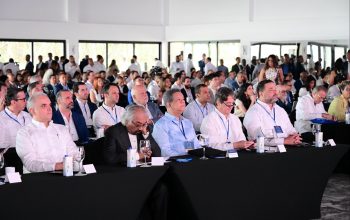news
“No Country Can Afford to Ignore Higher Education”
February 8, 2018
GFDD hosted a discussion on successful education and labor markets in its Washington, DC office, live-streamed to Funglode’s headquarters in Santo Domingo.
On February 8th, 2018 GFDD hosted an interesting and timely discussion on successful education and labor markets, with Maria Marta Ferreyra, Senior Economist, Office of the Regional Chief Economist for Latin America and the Caribbean of the World Bank, and author of "At a
Crossroads. Higher Education in Latin America and the Caribbean". Ferreyra presented the main results of her recent publication and gave an insightful regional panorama of the higher education sector; she also commented on the book "Making College Work: Pathways to Success for Disadvantaged Students", by Professor Harry Holzer of Georgetown University and Sandy Baum of the Urban Institute.
Some of the highlights of the discussion included the need of higher education institutions to help students connect with the labor markets, and also the urgency for the private sector to get together with universities to adjust the requirements and expectations.
In addition, Ferreyra noted that we need to provide students, starting in high school, with more information of the different career paths to help them visualize themselves in not-so-popular
choices as industrial engineering and other STEM related careers with better net rates of return.
“Public-private partnerships are crucial but will only work if the right incentives are in place to make the needed change happen in higher education”, said Maria Marta.
Dr. Leonel Fernández, former President of the Dominican Republic and President of GFDD/Funglode, participated in the event via videoconference, together with local
experts in Santo Domingo.
Semiramis De Miranda, acting Co-executive Director of GFDD participated in the event, and Maria Victoria Abreu, GFDD’s International Affairs and Socio-Economic Development Program Manager, introduced the experts and moderated the discussion.
The audience included members from the Inter-American Development Bank (IDB), the Organization of American States (OAS), the Embassy of the Dominican Republic in Washington, DC,
the Permanent Mission of the Dominican Republic to the OAS, Georgetown University, among others.
This topic is particularly important to GFDD as the Dominican Republic has the challenge of continuing improving its education system and learning from both the United States and the region to do so is the smart way to go.
Maria Marta Ferreyra is a senior economist at the Office of the Chief Economist for Latin America and the
Caribbean of the World Bank. Her research specializes in the Economics of Education, with special emphasis on the effects of large-scale reforms. She has written about the effects of large-scale policies in primary and secondary education in the United States, including school choice programs such as private school vouchers and charter schools, finance reform and accountability for public schools. At the World Bank she is co-leading a comprehensive study on higher
education in Latin America. Continuing with her interest in earlier education stages, she is also investigating the effects of teacher market reform in primary and secondary education, and of early childhood education programs. Her research has been published in journals such as the American Economic Review, the Journal of Public Economics, and the American Economic Journal-Economic Policy. Prior
to joining the World Bank, she served as a faculty member at the Tepper School of Business at Carnegie Mellon University. She holds a PhD in Economics from the University of Wisconsin-Madison.







